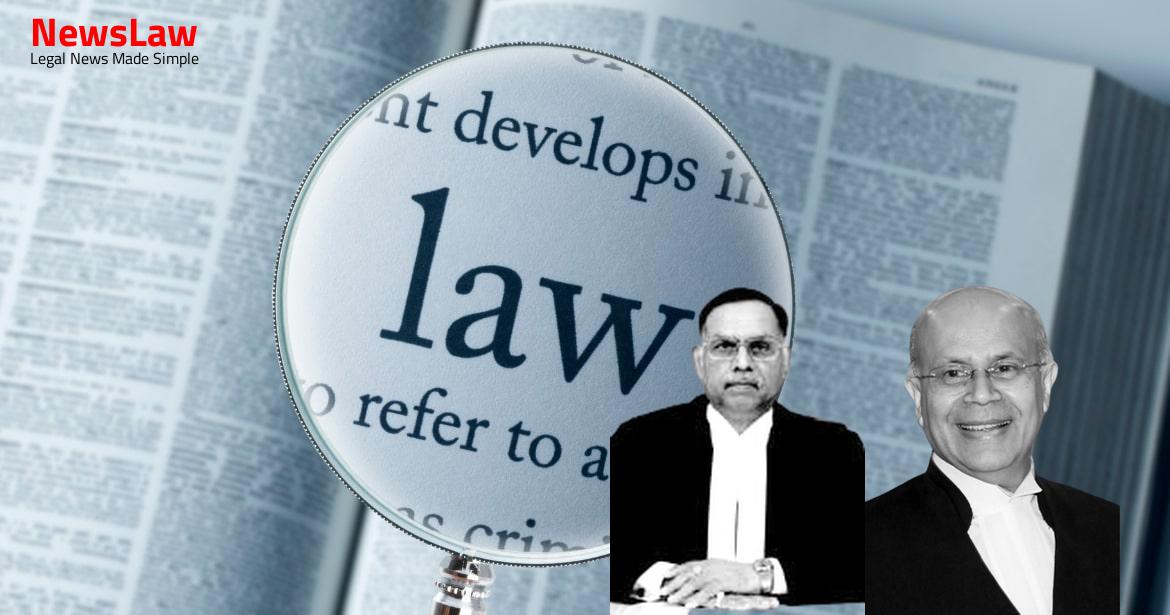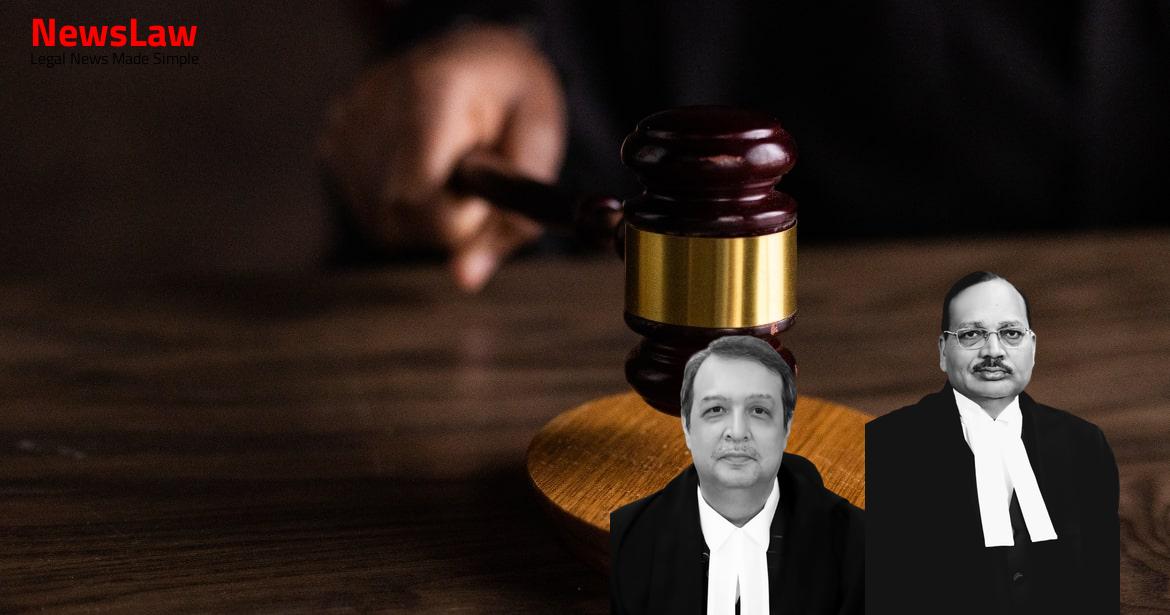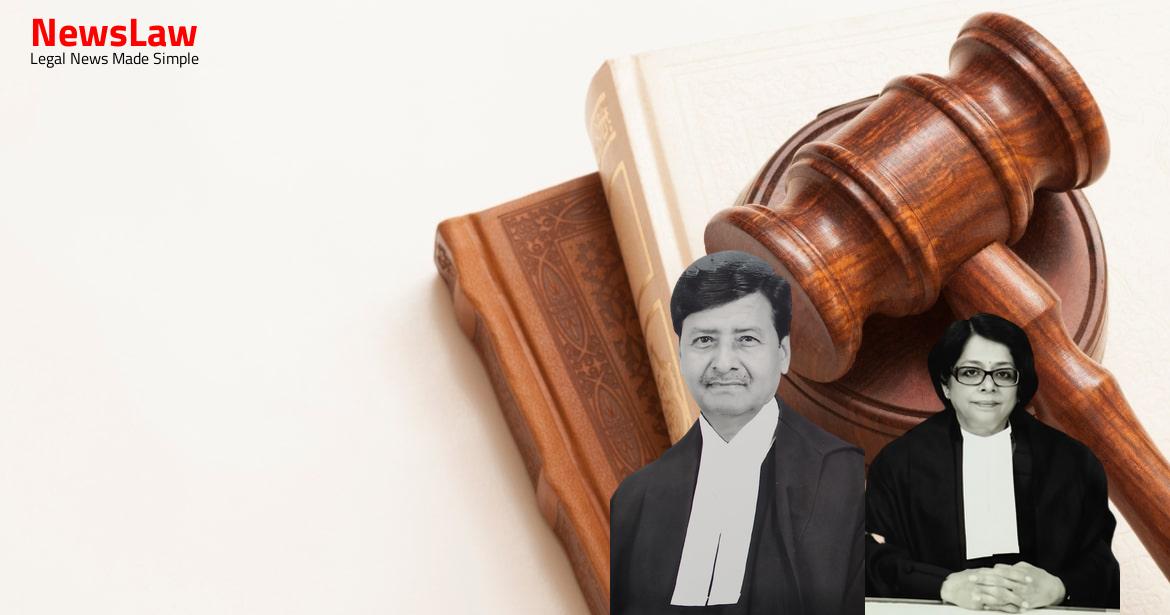The case of Revanna vs. Someswaraswamy involves a dispute over the validity of a non-alienation condition in a gift deed. The petitioners, sons of Defendant No.1 and great-grandsons of Muniswamappa, sought ownership of the property based on a gift deed condition. However, the High Court partially allowed their appeal, emphasizing Section 10 of the Transfer of Property Act. The respondents argued for the validity of the gift deed but faced challenges due to the non-alienation clause. Let’s unravel the legal complexities in this intriguing case.
Facts
- The High Court erred in not declaring the sale deeds null and void despite finding the condition in the gift deed valid.
- The plaintiffs, being the sons of Defendant No.1 and great-grandsons of Muniswamappa, are entitled to the sale consideration received by Defendant No.1.
- Defendant No.1, in dire need of money, executed the sale deeds under the belief that there was no legal impediment.
- The High Court partly allowed the appeal of the plaintiffs, but dismissed their claim for ownership of the property due to the valid condition in the gift deed.
- The plaintiffs are entitled to recover the sale consideration from Defendant No.1 as the sale deeds were declared void.
- Trial court found plaintiffs failed to prove absolute right over the property and defendant No.1’s right to alienate.
- High Court partially decreed the suit, stating plaintiffs are entitled only to what defendant No.1 received under the sale deeds.
- High Court disagreed with trial court on the validity of the condition in the gift deed and granted limited relief to plaintiffs.
- Plaintiffs filed a Regular First Appeal in the High Court, which held that trial court was in error regarding the voidness of the condition imposed on defendant No.1.
- High Court ordered the benefits received by defendant No.1 through the sale deed to be given back to the plaintiffs.
Also Read: Interpretation of Lease Agreement and Compulsory Registration
Issue
- The trial court framed five issues to be determined in the case.
- One of the issues is whether the plaintiff can prove their absolute right over the suit schedule properties.
- Another issue is whether the plaintiff can establish that Defendant No.1 has no right to alienate the property to Defendant No.2 and Defendant No.5.
- A question raised is whether the defendants can prove that the condition of restraint on alienation is void in law.
- The final issue pertains to what order or decree should be given in this case.
- The central question is whether the plaintiffs are entitled to the relief they are seeking.
Also Read: Enhancing Compensation and Modifying Sentences: A Legal Analysis
Arguments
- Defendant No.1 in the gift deed executed by the petitioner’s grandfather had only a life stake and could not alienate any properties.
- The gift deed dated 05.06.1957 in favor of Defendant No.1 was argued to be invalid by the petitioner’s counsel.
- The senior counsel for the respondents argued that the gift deed of 05.06.1957 was valid and not in violation of Section 13 of the Transfer of Property Act.
- It was contended that the gift deed, being in favor of Defendant No.1 and for the benefit of an unborn person, was void under Section 13 of the Transfer of Property Act.
- The respondent argues that the condition in the gift deed dated 05.06.1957, stating that the donee cannot alienate the property, is void.
- The learned counsel for the respondents believes that the High Court made a mistake in upholding the validity of the non-alienation condition.
- The respondent relies on Section 10 of the Transfer of Property Act, 1882, to support their argument that the non-alienation condition is void.
Also Read: Exemption from Property Tax for Central Government-owned Buildings
Analysis
- Section 10 of the Transfer of Property Act states that any condition restraining the transferee’s right of alienation is void.
- The gift deed in question contained a condition restricting the donee from alienating the property, which is void under Section 10.
- Section 13 of the Transfer of Property Act does not apply in cases where the gift is in favor of a named individual, as opposed to an unborn person.
- The condition in the gift deed that Defendant No.1 shall not alienate the property is void as per Section 10 of the Act.
- The gift in this case was in favor of an existing person and not an unborn individual, hence Section 13 does not apply.
- The creation of joint ownership with any subsequently born male children of the donee is permissible under Section 20 of the Act.
- Section 20 allows for the creation of an interest for the benefit of an unborn person who acquires it upon birth.
- Grandfather Muniswamappa gifted immovable property to his grandson, N. Revanna.
- The gift deed specified that the property can be enjoyed by the donee or his younger brothers during their lifetime.
- In case of the donee or his younger brothers dying issue-less, the property will devolve to Sri SOMESWARASWAMY of Sri Someswara Temple Ulsoor Civil Station Bangalore.
- The gift deed also mentioned the provisions of Section 13 of the Transfer of Property Act, which deals with transfers for the benefit of unborn persons.
- There is no restriction on transferring interest in favor of an unborn person.
- The judgment of Allahabad High Court in Smt. Brij Devi vs Shiva Nanda Prasad and others is relevant.
- The High Court considered Sections 10 and 126 of the Transfer of Property Act in this case.
- This case provided insights on the application and interpretation of Sections 10 and 126 of the Transfer of Property Act.
- Section 10 of Act, 1882 prohibits conditions restraining alienation in a transfer of property.
- Section 126 of Act, 1882 allows for the suspension or revocation of a gift based on certain conditions.
- The court found that the present case did not fall under Section 126.
- The Division Bench of the High Court emphasized that conditions imposed on a donee must not contradict Section 10 of the Act.
- The court rejected the argument that Section 126 is an absolute exception to Section 10 and upheld the importance of giving full effect to every section of an enactment.
- Various cases were cited to establish that conditions prohibited under Section 10 are applicable to gifts as well.
- The judgment in Smt. Prem Kali vs Deputy Director of Consolidation, Sitapur and others (2016(116) ALR 794) followed the earlier decisions of the High Court on this matter.
- Section 13 has no application in the present case based on a previous court judgment.
- Defendant No.1 was entitled to transfer the property received through a gift deed dated 05.06.1957.
- The High Court made an error in holding that Defendant No.1 could not transfer the property.
- The plaintiffs were not entitled to the declaration they sought in the suit.
Decision
- The appeal was carefully considered by the court.
- The arguments presented by the appellant were reviewed
- Upon thorough examination, it was concluded that there is no merit in the appeal
- The appeal was dismissed accordingly
Case Title: SRIDHAR Vs. N. REVANNA (2020 INSC 165)
Case Number: C.A. No.-001209-001209 / 2020



